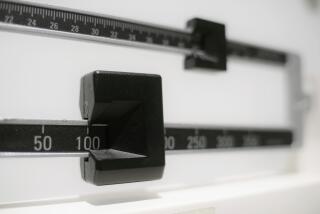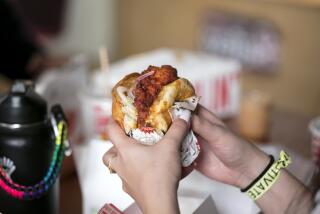Could ‘Stay Nervous’ Become New Motto for Keeping Off Weight?
- Share via
Fidgeting, pacing and other seemingly wasted motions can help prevent weight gain in some people, according to new research that may explain why some folks with the heebie-jeebies don’t get fat even when they indulge in the equivalent of two extra cheeseburgers a day.
The findings appear to be the first direct evidence that some people respond to sudden indulgence by getting more ants in their pants, automatically upping calorie-burning activities without realizing it.
In the Mayo Clinic study, 16 healthy volunteers consumed 1,000 calories more than their usual daily amount for eight weeks, with every meal prepared by a hospital nutritionist. Although all the subjects put on weight--from 2 to 16 pounds--those who did the most fidgeting and other “non-exercise” activities gained the least.
“There are people who in response to overeating will unconsciously move around more and therefore won’t gain as much weight as other people,” the study’s leader, Dr. Michael Jensen, said in an interview.
A key implication, the researchers said, was that becalmed people might better control their weight if they grew restless. The work appears today in the journal Science in time to boost flagging New Year’s resolutions.
At the same time, health experts cautioned that finger-wiggling and toe-tapping are no substitute for a moderate diet coupled with deliberate physical activity in the struggle against obesity, which affects about one in three Americans.
Generally, though, the new research suggests that behaving like a jumping bean is not necessarily a bad thing, in that ceaseless visits to the water cooler may no longer signify mere slacking off. Instead, they may be an example of an anti-fat mechanism that the Mayo Clinic researchers call NEAT, for Non-Exercise Activity Thermogenesis.
Researchers praised the study as groundbreaking.
“This is very important research that helps us understand why some people might be more inclined to gain weight than others,” given the same exercise patterns and diet, said Dr. Michael Hoffman of the Medical College of Wisconsin, who has performed exercise physiology research.
Previous work has established that slight physical effort burns calories that can add up over time. Standing for an hour burns about 140 calories, while sitting burns 100. And it is also known that some people have a higher basic metabolism than others, enabling them to burn calories more efficiently.
But the Mayo Clinic researchers observed something beyond high metabolism. Under stringent laboratory conditions they discovered a new “fidget factor,” as Jensen called it: an adaptive fat-fighting behavior unknown even to those engaged in it, whereby they warded off poundage during a bout of serious face-stuffing.
The 16 volunteers, 25 to 36 years old, spent two weeks eating laboratory meals and undergoing numerous measurements of body composition and energy expenditure as the researchers determined exactly how many calories the subjects required to maintain their body weight.
Then they started consuming an additional 1,000 calories daily, which was not as much fun as it might sound, no matter how much they liked laboratory-grade pizza. “Our biggest concern was in getting them to eat everything,” Jensen said.
Two months later, after performing the energy and body composition measurements again, the researchers inferred that the amount of weight gained was primarily determined by the calories burned during non-exercise activity.
Examples of such activity include getting in and out of one’s chair often, standing instead of sitting, stretching, correcting one’s posture, fidgeting and taking the stairs instead of the elevator, Jensen said.
In the most pronounced case, the fidget factor accounted for 692 calories burned per day--equal to about two hours of moderate walking. That person gained only 3 pounds. At the other end of the fidget scale was a subject who apparently succumbed to food-induced lethargy and decreased activity by 93 calories a day. That subject gained 16 pounds.
The researchers could not explain the finding that the four women in the study showed the smallest increases in non-exercise activity and gained the most weight.
Curiously, Jensen said, subjects who increased their non-exercise activity reported to the researchers that they felt less active than ever during the study, which supports the notion that the fidgeting response is unconscious.
Alas, the research did not address a question of interest to many potential practitioners of NEAT: If one eats the same amount of food, will more fidgeting lead to weight loss?
“I really can’t apply it to a weight loss scenario,” Jensen said.






